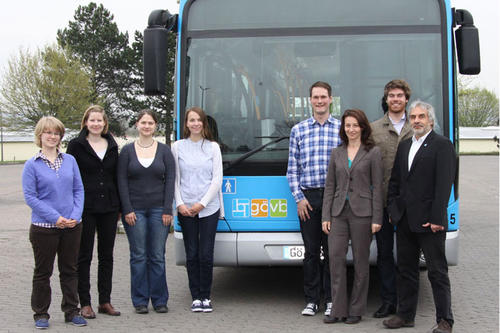Looking for a Little Improvement?
Right in time for the winter schedule, students of Information Systems at Freie Universität are researching optimum bus transportation.
Dec 10, 2014
From left: Anne-Katrin Engelmann (GöVB), Linda Albrecht, Annika Jähnig, Josephine Reuer (students of Freie Universität), Jan Fabian Ehmke and Natalia Kliewer (project managers), student Max Adam and GöVB Managing Director Michael Neugebauer
Image Credit: GöVB
Early morning, eyelids still drooping, under cloudy gray November skies. On days like this, it is a blessing if the bus comes on time and there is a place to sit without having to fight through the crowd.
Natalia Kliewer, a professor of information systems, and Professor Jan Ehmke of the School of Business and Economics at Freie Universität are working to make sure this is always the case. Together with their students, they are tinkering with ways to optimize bus transportation.
Operating a bus line is a science in itself. Vehicle schedules determine how many vehicles are used at what time, in what size, and on what line. These schedules are usually based on transit operators’ past experience.
Optimizing them was the research aim of students from Freie Universität, who embarked on a joint project with Göttinger Verkehrsbetriebe (GöVB), the local bus company in the city of Göttingen. Four students enrolled in the master’s program in Information Systems spent one semester working on the “Fleet Mix” project, with guidance and support from Kliewer and Ehmke.
Ehmke, a professor of advanced business analytics, is originally from Göttingen himself, and he already had ties with GöVB through prior research. “The data situation there was outstanding,” Ehmke says. For the Fleet Mix project, the team from Freie Universität had access to all of the passenger figures. Another plus was that there are no S-Bahn or U-Bahn rail systems in Göttingen; all local public transit is handled by the bus fleet. “In Berlin, with its S-Bahn and U-Bahn network, our research would have been much more complex,” Kliewer says.
Billions and Billions of Possible Combinations
Kliewer is the optimization specialist; she uses mathematical algorithms to analyze the transit operators’ data volumes and link them together to form optimum schedules. Billions and billions of possibilities have to be calculated. How many people will travel to where, from where, and when? Which buses – long articulated buses or smaller models – should be used in order to prevent buses from traveling empty while at the same time allowing all passengers to find a seat? “There is tremendous complexity in terms of combinations behind these planning processes,” Kliewer says.
Ehmke provides itemized data for Kliewer’s optimization work, simulating various future scenarios, such as certain percentage changes in the population. “Intelligent data analysis” is the term for the combination of statistical data and possible future models that are then ultimately used to map out recommendations. For GöVB, the Fleet Mix project team had good news: It was possible to travel the routes with fewer vehicles overall, and most particularly with a smaller fleet of the expensive articulated buses.
Practice as an Integral Element of the Study Progra
The students of information systems learn the theoretical tools of the trade for intelligent data analysis and optimization during the base semesters of their master’s program. “The students are rewarded for their efforts during the practice-related projects in the third semester,” Ehmke says, adding, “They see how their studies are connected to real-world practice.” The students spend an entire semester in contact with companies such as Lufthansa, in Frankfurt – or, indeed, Göttinger Verkehrsbetriebe.
In the Fleet Mix project, the students did more than just juggle algorithms; they also negotiated with the Managing Director. “This is a great opportunity to get to know very different fields of work that involve information systems,” says Kliewer.
The two academics now have a different view of local and long-distance public transit in their everyday lives as well – an “occupational hazard,” as Ehmke says. But even they are not immune to strikes among bus and train operators or to ice on tracks or roads. Not yet, anyway: Kliewer is already doing research on how these kinds of disruptions can be taken into account in a forward-looking way. After all, there’s always room for improvement somewhere.
m
Further Information
- Prof. Dr. Natalia Kliewe, Freie Universität Berlin, Fachbereich Wirtschaftswissenschaft, Tel.: +49 30 838 55009 , E-Mail: natalia.kliewer@fu-berlin.de
- Prof. Dr. Jan Fabian Ehmke, Freie Universität Berlin, Fachbereich Wirtschaftswissenschaft, Tel.: +49 30 83858731, E-Mail: JanFabian.Ehmke@fu-berlin.de
- Masterstudiengang Wirtschaftsinformatik
- Fachbereich Wirtschaftswissenschaft

